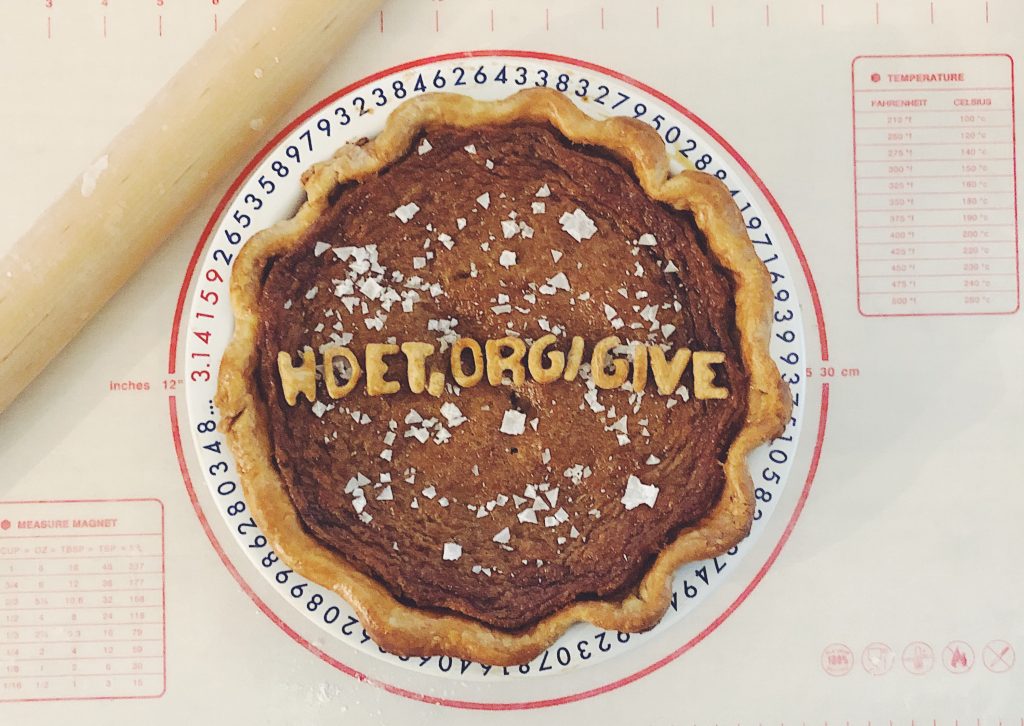This Math Professor Serves Up 1,200 Digits of Pi
March 14th is Pi Day. We asked why people celebrate Pi and got a rational response.


If you’ve ever baked a pie and wanted to measure its roundness, then you need to know something about pi.
Maybe you remember this formula from math class:
C = πd
“C” is the circumference of a circle. To find it, you multiply its diameter (d) by the value pi, represented by the Greek letter π. Expressed numerically, it’s approximately 3.14159.
Since it was first defined more than 2,000 years ago, mathematicians have tried to find pi’s exact value.
“I think the stereotype that people don’t like math is not quite true.” — Prof. Wayne Raskind
Wayne State University math professor Wayne Raskind says they’re still trying.
“As of now, it has been calculated to approximately 30 trillion places,” Raskind says.
Pi is considered an irrational number. You could try calculating it to its last decimal point and you’d never reach the end, nor would you encounter a repeating sequence of numbers. Some, including Prof. Raskind, have memorized pi well beyond its first few digits.
“In my youth, I could memorize about 1,200 places of pi,” Raskind recalls. “I’m not sure I could recite them now, but on a good day, I can do about 150 to 200.”
Watch: Prof. Wayne Raskind serves up 1,200 digits of pi.
Pi has many fans, who celebrate National Pi Day on March 14 (3/14). The U.S. House of Representatives passed a non-binding resolution recognizing Pi Day in 2009. In recent years, Raskind says Wayne State has ramped up its efforts to spread awareness and appreciation of pi.
“We have a STEM day,” Raskind says (STEM stands for science, technology, engineering and math). “I did a session on everything you always wanted to know about pi. I had about 35 students or so, and they loved it.”
Raskind says he hopes promoting pi day will help people appreciate math more, and break stereotypes about those who are interested in mathematics.
Click on the player to hear Pat Batcheller’s interview with Wayne Raskind, and read a transcript, edited for clarity, below.
Pat Batcheller, 101.9 FM, WDET: Pi has been calculated to about 30 trillion places. Why does it go on forever like that?
Wayne Raskind, Wayne State University mathematics professor: Pi cannot be expressed as a fraction. A lot of people think pi is equal to 22/7. It is approximately that, but because it can’t be expressed as a true fraction, it’s called an irrational number. Pi has no resolution, doesn’t repeat, and has no discernible pattern in its digits.
How many digits of pi can you count from memory?
Well, in my youth — was a bit misspent — I could memorize about 1,200 places of pi. I’m not sure I could recite them now, but on a good day, I can do about 150 to 200.
As a math professor, how do you engage your students in concepts like pi?
I just try to let them know what it can be used for. But, I think sometimes when we teach students who are not going to be mathematicians, sometimes we I think we undersell it and we don’t talk enough about the inherent beauty of mathematics.
Why do we celebrate pi?
The idea of Pi Day on a larger scale seems to have started about 1988. The U.S. House of Representatives passed a non-binding resolution in 2009 to mark Pi Day, and just in the last ten years, awareness has increased quite a bit. We’ve ramped up our activities here at Wayne State.
How so?
We have a STEM [science, technology, engineering and math] day. Last year, something like 2,000 high school students came here for that. I did a session on everything you always wanted to know about pi. I had maybe 35 students or so, and they loved it. I think the stereotype that people don’t like math is not quite true. So when we observe things like this, it helps spread the word.
What is something we probably don’t know about pi that would surprise us?
If you take three mathematical constants—Euler’s number (e), which equals about 2.7; the square root of -1 (i); and pi—then write them as , it’s one of the most beautiful formulas in mathematics.
Support the news you love.
Here at WDET, we maintain our journalistic integrity through independent support from readers like you. Because you value WDET as your source of news, music, and conversation, please make a gift today.

 , it’s one of the most beautiful formulas in mathematics.
, it’s one of the most beautiful formulas in mathematics.